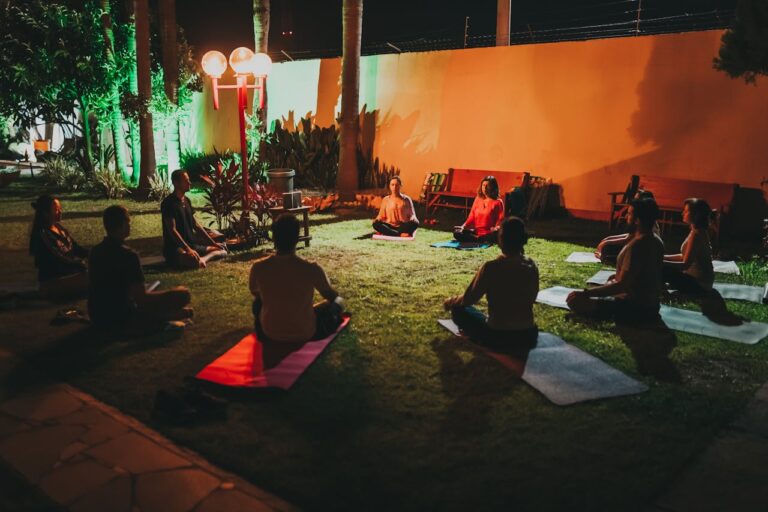Exploring the Benefits of Meditation for Anxiety Relief

By Temple of Umi

Table of Contents
Explore the benefits of meditation for anxiety relief and how it can change your approach to mental health. Embrace meditation as a key strategy for managing anxiety and improving your overall well-being.
Introduction
Anxiety is a prevalent mental health condition characterized by persistent worry and fear that can significantly disrupt daily life. From affecting work performance to straining relationships, the impacts of anxiety are far-reaching and can diminish overall quality of life. Fortunately, there are various strategies to manage this condition, and one of the most influential and accessible options is meditation. Meditation has been shown to offer profound benefits for anxiety relief, helping individuals regain a sense of calm and control over their thoughts and emotions.
Understanding Anxiety
Definition and Common Symptoms of Anxiety:
Anxiety is more than just feeling stressed or worried. While stress dissipates once the external situation is resolved, anxiety persists, often without any apparent cause. Common symptoms include excessive worrying, restlessness, fatigue, difficulty concentrating, irritability, muscle tension, and sleep disturbances. These symptoms can be so overwhelming that they interfere with daily activities and personal relationships.
Psychological and Physical Effects of Anxiety:
Psychologically, anxiety can lead to a vicious cycle of fearful thoughts that seem impossible to control, impacting mental health and leading to issues like depression or even anxiety-induced paralysis in decision-making. Physically, it can manifest through an increased heart rate, rapid breathing, sweating, trembling, and gastrointestinal problems. Chronic anxiety can also lead to long-term health complications, including heart disease, high blood pressure, and a weakened immune system.
The Prevalence of Anxiety Disorders in Society:
Anxiety disorders are among the most common mental health conditions globally. They affect millions of adults and children, making them a significant public health concern. The widespread prevalence underscores the need for effective treatment strategies, which is why the exploration of meditation as a tool for anxiety relief is not just relevant but essential. By incorporating meditation practices into daily routines, individuals can harness its benefits to manage anxiety more effectively and improve their overall well-being. Learn more.
The Basics of Meditation
What is meditation? An overview.
Meditation is a practice in which an individual uses techniques such as mindfulness, or focusing the mind on a particular object, thought, or activity, to train attention and awareness and achieve a mentally clear, emotionally calm, and stable state. It has been used for centuries to relieve stress and improve concentration.
Different types of meditation practices suited for anxiety relief
- Mindfulness Meditation: This involves being fully present and aware of your surroundings and feelings without interpretation or judgment. Practicing mindfulness meditation can help you detach from anxiety-driven thoughts and give you a sense of calm and balance.
- Guided Meditation: Often led by a narrator, this form of meditation involves visualizing cheerful scenes or experiences to induce calm. The guidance can distract from anxious thoughts and lead to deep relaxation and peace.
How meditation affects the brain and body
- Brain Changes: Meditation has been shown to decrease activity in the amygdala, the area of the brain responsible for processing stress, fear, and anxiety. It also enhances connectivity in the prefrontal cortex, which governs our ability to regulate emotions.
- Physical Benefits: Regular meditation can lower the levels of stress hormones like cortisol and reduce inflammation in the body. It also helps lower blood pressure, improve sleep, and alleviate stress, significantly improving overall anxiety relief. Learn more.

Scientific Insights: How Meditation Aids Anxiety Relief
Review of scientific studies linking meditation to reduced anxiety
Studies have consistently found that meditation can significantly reduce anxiety levels. For instance, a meta-analysis of nearly 1,300 adults found that meditation can decrease anxiety. Notably, the effect was most substantial among those with the highest levels of anxiety.
The role of meditation in stress reduction and emotional regulation
- Stress Reduction: Meditation helps lower stress levels by calming the mind and reducing the fight-or-flight response, providing a profound sense of peace and relaxation.
- Emotional Regulation: Meditation teaches you to observe your emotions without judgment, which can help you understand and manage them more effectively. This is particularly beneficial for those suffering from anxiety, as it helps prevent the escalation of negative emotions and thoughts.
Long-term benefits of regular meditation practice for anxiety sufferers
- Increased Resilience: Regular meditators report feeling less anxiety over time, during the meditation session, and in general life.
- Improved General Well-being: Beyond reducing anxiety, meditation contributes to an overall higher quality of life by improving mood and social interactions, reducing symptoms of anxiety-related disorders, and enhancing self-esteem and self-acceptance.
Practical Guide to Starting Meditation for Anxiety
Step-by-step Guide to Beginning a Meditation Practice
- Find Your Style: Explore different forms of meditation, such as mindfulness, guided meditation, or breathing exercises, to discover what feels best for you.
- Start Small: Begin with short sessions, about 5-10 minutes each day, and gradually increase the duration as you become more comfortable.
- Consistent Timing: Try to meditate at the same time each day to establish it as a part of your routine, making it easier to stick to.
- Focus on Breath: During meditation, concentrate on your breathing pattern; inhale deeply and exhale slowly. This focus will help calm your mind and reduce anxiety.
Tips for Creating a Calming Meditation Environment
- Choose a Quiet Spot: Find a peaceful area in your home where you won’t be disturbed.
- Comfort is Key: Use a comfortable seat or cushion; comfort is essential for maintaining focus.
- Minimize Distractions: Turn off electronic devices or use them in Do Not Disturb mode to avoid interruptions.
- Personal Touches: Add elements that enhance tranquility, such as soft lighting, candles, or soothing background music.
How to Incorporate Meditation into Your Daily Routine for Maximum Benefits
- Morning Meditation: Start your day with a meditation session to ground yourself and set a calm tone for the day ahead.
- Mindful Breaks: Take short meditation breaks during the day, especially during high-stress times, to reset and refocus.
- Evening Wind-Down: Conclude your day with a meditation session to help you unwind and ensure a restful night’s sleep.
- Use Apps: Leverage meditation apps that offer guided sessions and reminders to help you stay committed to your practice.
Addressing Challenges in Meditation
Common Challenges Beginners Face When Starting Meditation for Anxiety Relief
- Wandering Mind: It’s natural for your mind to wander. Gently bring your focus back to your breath without judgment.
- Impatience: Feeling like meditation needs to be fixed can be discouraging. Understand that benefits can take time to manifest.
- Physical Discomfort: Adjust your posture or where you meditate if you find it hard to stay seated or relaxed.
Strategies for Overcoming These Challenges
- Guided Meditations: Use guided sessions from apps or online platforms to help maintain focus and structure in your practice.
- Regular Practice: Consistency is critical. The more regularly you meditate, the easier it becomes to enter a meditative state.
- Flexibility: Be flexible in your approach. If a particular style needs to be fixed, try another until you find what suits you best.
The Importance of Consistency and Patience in Meditation Practice
- Building a Habit: Building any habit, including meditation, takes time. Regular practice reinforces the habit and enhances its benefits.
- Long-Term Perspective: Consider the long-term effects of your meditation practice. Benefits such as reduced anxiety and improved mental well-being accumulate over time. Compassion: Be kind to yourself if progress seems slow. Meditation is a personal journey and evolves differently for each individual. Learn more.
Personal Stories: Successes and Transformations
Meditation has long been touted as a powerful tool for managing stress and anxiety, and personal accounts from those who’ve embraced it are both inspiring and instructive. Here are some anecdotes and testimonials that highlight the transformative power of meditation for anxiety relief:
- John’s Journey: After struggling with generalized anxiety disorder for years, John turned to mindfulness meditation as a last resort. Initially skeptical, he committed to ten minutes daily. Over time, not only did his anxiety levels decrease, but he also noticed a significant improvement in his ability to handle stress at work and in personal relationships. Meditation taught him to observe his thoughts without judgment, reducing their power over him.
- Maria’s Milestone: Maria, a college student overwhelmed by performance anxiety, found solace in guided meditation sessions. These sessions, often featuring soothing narratives and breath work, helped her center her thoughts and calm her mind before exams. The practice alleviated her anxiety and changed her approach to stressful situations, making her more composed and confident.
- Ethan’s Experience: Ethan, who suffered from panic attacks, discovered meditation through a wellness workshop. Integrating techniques such as focused attention and progressive muscle relaxation into his daily routine, he experienced a remarkable decrease in the frequency and intensity of his panic attacks. Meditation enabled him to understand better and regulate his emotions, fundamentally altering his response to anxiety triggers.

Final words
Reflecting on these stories underscores the profound benefits of meditation for anxiety relief. Meditation is not just a practice but a journey towards self-awareness and inner peace. Here’s a recap of how meditation aids in managing anxiety:
- Reduces Stress: Regular meditation decreases the stress hormone cortisol, thus reducing the overall feeling of anxiety.
- Enhances Emotional Health: It cultivates a better mood and outlook on life, which can alleviate anxiety symptoms.
- Improves Focus: Meditation increases mental clarity and focus, helping to distract from anxious thoughts.
These benefits invite anyone grappling with anxiety to consider meditation not merely as an alternative therapy but as a central component of their mental health strategy. As the personal stories highlighted, meditation can transform lives, providing a solid foundation for handling life’s stresses and challenges more effectively.
Remember that your mental health is critical to your overall well-being. Meditation, along with other self-help strategies and professional guidance, can equip you to navigate the complexities of anxiety and lead a healthier, more balanced life. Whether you are dealing with minor stress or more significant anxiety issues, integrating meditation into your daily routine could be the key to unlocking a calmer, more centered version of yourself.
- Sacred Plant Medicine Retreats in Georgia
- 5 Ayahuasca Retreats in California Worth Exploring
- 7 Best Aya Retreats in America. Click here.
- Mcdonough Ayahuasca retreat
- Conley Ayahuasca retreat
- Whitesburg Ayahuasca retreat
- Brooks Ayahuasca retreat
- Gay Ayahuasca retreat
- Williamson Ayahuasca retreat
- Orchard Hill Ayahuasca retreat
- Glenn Ayahuasca retreat
- Luthersville Ayahuasca retreat
- Shady Dale Ayahuasca retreat
- Bowdon Junction Ayahuasca retreat
- Sargent Ayahuasca retreat
- Greenville Ayahuasca retreat
- Lovejoy Ayahuasca retreat
- Winston Ayahuasca retreat
- Rutledge Ayahuasca retreat
- Moreland Ayahuasca retreat
- Molena Ayahuasca retreat
- Lebanon Ayahuasca retreat
- Good Hope Ayahuasca retreat
- Haralson Ayahuasca retreat
- An Inclusive List of Psychedelic Quotes
- Mount Ayahuasca retreat
- Grantville Ayahuasca retreat
- Pine Lake Retreat near
- Rydal Ayahuasca retreat
- Porterdale Ayahuasca retreat
- Waco Ayahuasca retreat
- Temple Ayahuasca retreat
- Bethlehem Ayahuasca retreat
- Jenkinsburg Ayahuasca retreat
- Adairsville Ayahuasca retreat
- Red Oak Ayahuasca retreat
- Woodbury Ayahuasca retreat
- Cassville Ayahuasca retreat
- Redan Ayahuasca retreat
- North Decatur Ayahuasca retreat
- Grantville Ayahuasca retreat
- Hillsboro Ayahuasca retreat
- Jackson Ayahuasca retreat
- Braselton Ayahuasca retreat
- Zebulon Ayahuasca retreat
- Flovilla Ayahuasca retreat
- Auburn Ayahuasca retreat
- Warm Springs Ayahuasca retreat
- Scottdale Ayahuasca retreat
- Lithia Springs Ayahuasca retreat
- Villa Rica Ayahuasca retreat
- Grayson Ayahuasca retreat
- Sunny Side Ayahuasca retreat
- Senoia Ayahuasca retreat
- Locust Grove Ayahuasca retreat
- Chamblee Ayahuasca retreat
- Fairburn Ayahuasca retreat
- Snellville Ayahuasca retreat
- Monticello Ayahuasca retreat
- Union City Ayahuasca retreat
- Tallapoosa Ayahuasca retreat
- Bremen Ayahuasca retreat
- Hampton Ayahuasca retreat
- Monroe Ayahuasca retreat
- Marble Hill Ayahuasca retreat
- Madison Ayahuasca retreat
- Dawsonville Ayahuasca retreat
- Felton Ayahuasca retreat
- Concord Ayahuasca retreat
- Mansfield Ayahuasca retreat
- Taylorsville Ayahuasca retreat
- Roopville Ayahuasca retreat
- Turin Ayahuasca retreat
- Franklin Ayahuasca retreat
- Clarkdale Ayahuasca retreat
- Talking Rock Ayahuasca retreat
- Jersey Ayahuasca retreat
- Kingston Ayahuasca retreat
- Bostwick Ayahuasca retreat
- North Metro Ayahuasca retreat
- Meansville Ayahuasca retreat
- Social Circle Ayahuasca retreat
- White Ayahuasca retreat
- Rhode Island Ayahuasca retreat
- Maryland Ayahuasca retreat
- Delaware Ayahuasca retreat
- New Jersey Ayahuasca retreat
- Connecticut Ayahuasca retreat
- Massachusetts Ayahuasca retreat
- Hampshire Ayahuasca retreat
- Pennsylvania Ayahuasca retreat
- New York Ayahuasca retreat
- Florida Ayahuasca retreat
- South Carolina Ayahuasca Retreat
- North Carolina Ayahuasca Retreat
- West West Virginia Ayahuasca retreat
- Virginia Ayahuasca retreat
- Ohio Ayahuasca retreat
- Alabama Ayahuasca retreat
- Mississippi Ayahuasca retreat
- Tennessee Ayahuasca retreat
- Kentucky Ayahuasca retreat
- IndianaAyahuasca retreat
- ILLINOIS Ayahuasca retreat
- Missouri Ayahuasca retreat
- Arkansas Ayahuasca retreat
- Louisiana Ayahuasca retreat
- Texas Ayahuasca retreat
- Oklahoma Ayahuasca retreat
- KansasAyahuasca retreat
- Ayahuasca retreats near me in Experiment.
- A wellness retreat in Georgia
- What is Ayahuasca?
- Embark on a Journey of Transformation with Spiritual Healing
- Unveiling Healing Energy at the Temple of Umi
- 10 Energy Healing Techniques to Transform Your Life
- Where to get Ayahuasca in the USA
- Top Ayahuasca retreats in the USA. Learn more.
- Cost of Ayahuasca Retreat: Balancing Cost and Experience. Learn more.
- What is trauma bonding?
- A Journey into the Healing Properties of Psychedelic Mushrooms. Learn more.
- Ayahuasca Retreat Georgia – Experience Spiritual Awakening
- Spiritual Retreats Georgia
- Shaman in America Exploration
- Shamanism – Shamanic healing
- Shaman Healing Guide
- Ayahuasca ceremonies Ayahuasca ceremonies near you in the USA
- Ayahuasca Experience
- DMT Journey, Benefits, and Side Effects
- Iowaska – What is it?
- Plant medicine retreats in Georgia
- Why massage is beneficial, according to a cardiologist.
- Are mushrooms truffles – What Is a Truffle?
- 11 Best Ayahuasca Retreats in the USA for Spiritual Healing
- What is Rapé?
- What is a Tincture?
- Where to find Ayahuasca near me
- Healing retreats USA
- Best Retreats USA








